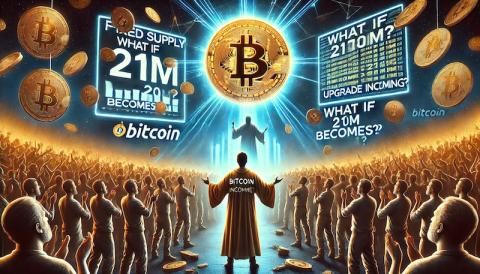Every other day, I open LinkedIn and see another Bitcoin believer trying to "educate" the non-believers. The usual spiel: "There are only 21 million Bitcoins that will ever exist! Bitcoin is the ultimate anti-inflationary asset!" Yeah, yeah, we've all heard it before.
But let's be honest—do you really believe what you're saying?
Personally, I don't exclude a chance within 10 years we might see inflation within Bitcoin itself. Why? Because the moment the system needs it, there will be an "upgrade," an "update," and—surprise!—suddenly there are 210 million, or even 21 billion, Bitcoins in existence. The narrative of fixed supply is appealing, but history has shown us that when economic pressures build up, rules get rewritten. Think it won't happen to Bitcoin? Just wait.
Another alternative I see, there will be spinoff from Bitcoin itself, leaving it with its 21 Million coins in existence, while market will move to some Bitcoin 2.0 (like there already have been attempts with Bitcoin Cash, Bitcoin Gold and other forks)
And let’s talk about the cult mentality surrounding Bitcoin. These never-ending echo chambers where believers hype it up as the solution to everything—it's no different from any other ideology that thrives on unwavering faith. To be fair, this unwavering belief does help Bitcoin flourish; it's the fuel behind its adoption. But let's not confuse faith with facts.
After almost eight years in the crypto space, I still ask myself the same question: What exactly can you do with Bitcoin? "Digital gold"? Sure—except you can just take Paxos Gold (PAXG) and have real, tangible, digital gold. "Decentralized currency"? Well, most Bitcoin is held on centralized exchanges (CEXs), which means decentralization is more of a marketing slogan than a reality.
Don't get me wrong—I'm not anti-Bitcoin. In fact, I consider myself quite the optimist when it comes to its potential. But I just don't get all these cult-like proclamations that seem to ignore practical realities. Bitcoin has its merits, but it's far from being the economic messiah some people make it out to be.
Here’s the simple truth: Bitcoin is an experiment, and experiments evolve. Fixed supply? Immutable code? Decentralization? These are all ideals, not guarantees. At the end of the day, Bitcoin is only as good as the collective belief in it—and beliefs change, especially when profit is on the line.
So before you post another Bitcoin-101 lecture, ask yourself: Do you really believe it’s immune to the same pressures that shape every other financial system? Or are you just repeating what you want to believe?
